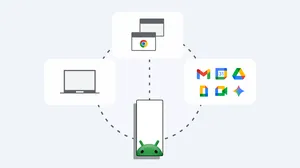5 mobile management trends for financial organizations
In a rapidly evolving industry, financial services organizations need to respond to more than just economic challenges and opportunities. IT and business leaders in banking, asset management, insurance and fintech face hurdles ranging from evolving workforce models with new customer and employee expectations, to the push and pull between strict regulations and a growing digital landscape.
Based on recent research, we’ve found five key trends that illustrate how modern mobile solutions, like Android Enterprise, can support the financial services industry in this ever-changing environment.
1. Distributed teams need tech that meets them where they are.
With 78% of financial services organizations offering fully flexible work, mobile management has never been more valuable to properly equip your workforce. But sending devices to employees here, and having IT manage them there, gets complex fast. A modern mobility solution provides simple, secure deployment so that devices are configured, remotely managed and work right out of the box.

2. The future of service is (literally) in customer and employee hands.
Digital experiences, especially in retail banking, are transforming how consumers expect to access information and customer service. Mobile devices can help financial services organizations meet these expectations, like enabling one-on-one mobile consultations with investment experts or creating easier check-ins for onsite customers.
3. Separating work data and personal privacy balances productivity and security.
Over 75% of tasks in the insurance industry can be performed remotely without losing any productivity. But strict regulations within the financial services industry can make it tricky to take advantage of a distributed workforce. The right management solution is key to mitigating data leaks and regulatory fines. Android Work Profile creates a clear separation between your organization's data and an employee’s personal privacy on the same device, maintaining the efficiency of a single device without sacrificing security.

4. Mobility innovation will establish a competitive advantage for financial organizations.
Among 250 surveyed asset managers, 95% of respondents believe [their] technology, data and digital capabilities will be differentiators in 2025. With a proper mobile management solution that offers data, analytics and research tools on one device, future-forward asset managers and other financial services professionals can free themselves from their desks and meet their customers wherever they are with modern services like a secure, mobilized trading desk or self-service kiosks.
5. More device management options means more flexibility.
Based on a recent survey, only 16% of U.S. financial firms believe bring-your-own-device (BYOD) solutions will be the dominant ownership model in 12 to 18 months.
1
Many financial organizations are returning to a corporate-liable model due to the security risks that come with BYOD. But they still need to ensure employee satisfaction by enabling corporate-liable devices for personal use. Finding a mobile platform that supports a variety of mobile management modes can offer a business more flexibility in accommodating various employee requirements. For instance, a bank could use fully managed devices for a call center while providing its branch managers with phones that can separate personal and business data with Android Work Profile.
Modern mobility solutions offered by Android Enterprise can help business leaders confidently meet these trends and the challenges that come with them — and ultimately set the standard for financial organizations.
Dive deeper into these learnings by downloading our new ebook “Flexible. Powerful. Modern. The standard of mobility for financial services.” And join our upcoming webinar to hear more about the value of modern mobility for the financial services industry’s unique needs and evolving demands.







